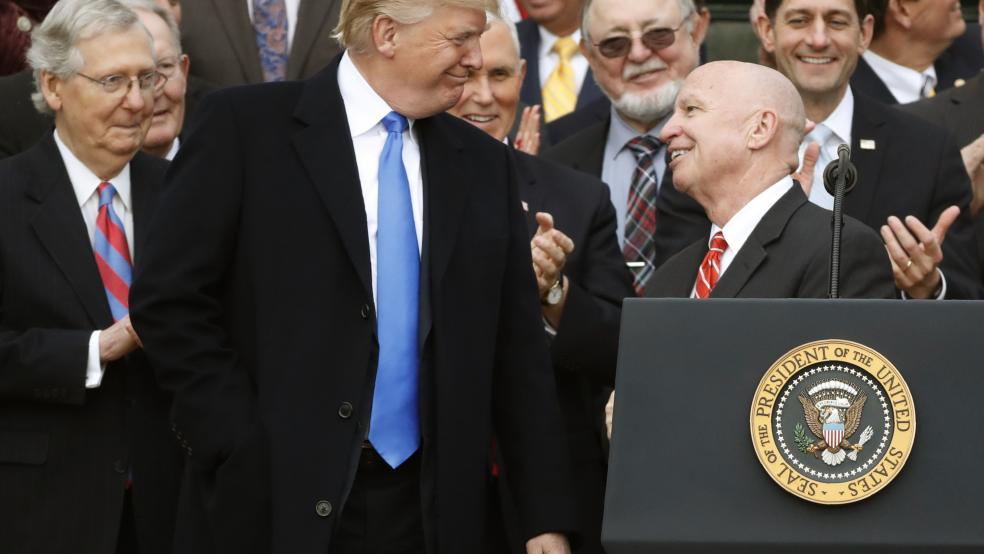The federal deficit for fiscal 2019 was nearly $1 trillion, and the national debt is going to hit $23 trillion within a matter of days.
President Trump once said he would eliminate the national debt within eight years, but it has continued to grow during his time in office and is now $3 trillion higher than when he first entered the White House. “In nearly three years, it rose 15% — from $19.9 trillion to $22.9 trillion, according to the latest numbers from the Treasury Department,” Caroline Cournoyer of CBS News said Tuesday.
Yet, as economist Paul Krugman notes in his latest New York Times column, the reaction to the dramatic rise in the deficit, on the whole, has been decidedly undramatic: “Were there fiery speeches in Congress, denouncing fiscal irresponsibility? No. Was there intense media coverage? No — the story was tucked deep inside major newspapers. Was there severe market reaction? No — interest rates are substantially lower than they were before the deficit surge.”
So how big a threat is the rapidly rising deficit? Two pieces in Tuesday’s New York Times lay out very different answers — though the one thing they agree on is the sad state of fiscal conservatives. Here’s a quick summary.
From the Left: Krugman has long argued that the deficit wasn’t a crisis in the aftermath of the financial crisis and it isn’t one now. “In fact,” he writes in his latest column, “leading economists are now telling us that concerns about government debt have been greatly exaggerated all along. The Very Serious People were completely wrong, and those who opposed austerity have been vindicated.” But the conspicuous current silence of many Republicans who emphatically warned about the dangers of the deficit several years ago — and then proceeded to inflate the deficit in order to pass their tax cuts — highlights a media double standard, Krugman says:
“When progressives propose new or expanded social programs, they face intense media scrutiny bordering on harassment over how they intend to pay for these programs. Republicans proposing tax cuts don’t face anything like the same scrutiny; they are seemingly able to get away with blithe assertions that tax cuts will pay for themselves by boosting economic growth, even though every single piece of evidence we have says that this is nonsense.”
From the Right: The national debt is heading toward unprecedented levels, and the Congressional Budget Office has warned that our current trajectory raises the risk of a future crisis. Philip Klein, executive editor of The Washington Examiner, writes in the Times that ignoring those warnings would be a potentially costly mistake:
“Skeptics argue that persistently low interest rates and consistent demand for domestic bonds in the past decade of rising debt have disproved old economic assumptions and have instead shown that extraordinarily high levels of federal debt do not matter. But making policy on the basis of this new assumption requires taking a leap of faith that this will continue to be true after decades of record-shattering debt — thus gambling with the futures of younger generations.”
Yet Republicans have gone from “sanctimonious outrage” about the deficit during Barack Obama’s presidency to silence under Trump. “In some senses,” Klein writes, “the Trump era is emblematic of a long-running tendency of Republicans to rail against spending during Democratic administrations only to abandon fiscal restraint when one of their own is in power. Even still, Mr. Trump’s ascendance points to a broader shift on the right. Republicans are increasingly dependent on older voters to win elections, who in turn don’t want to see changes to Social Security and Medicare.”
The result is that small-government conservatism has largely been brushed aside, replaced by escalating Trumpian culture wars. The GOP may come to lament that fiscally reckless turn. “Republicans may convince themselves that they can cut taxes every time they take power,” Klein writes, “but the reality is that if the long-term debt is not put on a manageable trajectory through reasonable reforms, it will require enormous, crushing tax increases just to sustain existing government programs.”





